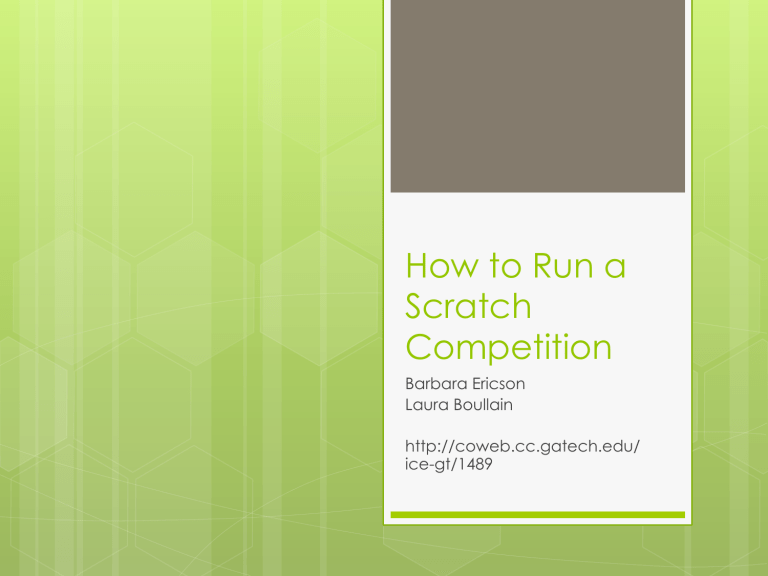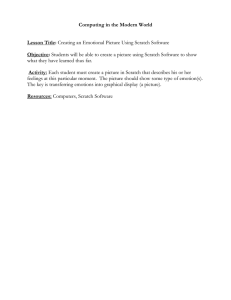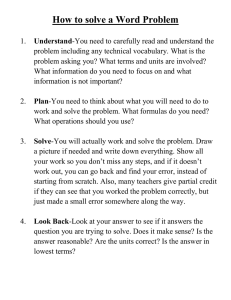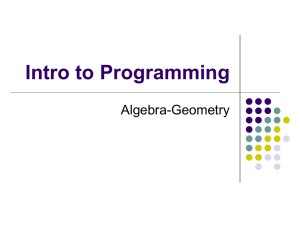
How to Run a Scratch Competition Barbara Ericson Laura Boullain http://coweb.cc.gatech.edu/ ice-gt/1489 What is Scratch? Free software from MIT – scratch.mit.edu Designed for – elementary to college aged Low floor – easy to get started High celling – lots you can learn and do Wide walls – many different types of projects Versions of Scratch 1.4 – installed to your local machine Runs on any type of computer 2.0 – current version runs in a browser and is Flash based Won't run on iPads A installable version of 2.0 will be availble by the end of August 2013 Snap – version of Scratch 1.4 from Berkeley Runs in a browser Scratch 2.0 new features Create your own blocks Cloning Cloud data Sound editor Video sensing Vector graphics Backpack to share sprites and scripts Agenda Why run a Scratch competition? Georgia Tech's competitions Competition details How to advertise the competition Registration Entries Judging Awards Ceremony Timeline Scratch Resources Why run a competition? Encourages Scratch local teachers to teach Many teachers are afraid of programming and are reluctant to teach it Need to get more teachers programming – 10,000 teachers by 2016-2017 for AP CSP Improves student's confidence and feeling of belonging in computing Can increase parental support since families come to the award ceremony GT competitions Number of entries in each competition since 2010 Competition has had high female and minority participation Majority female in 2011 (51%) 44% URM in fall 2012 180 160 140 Limited to 10 entries per school 120 100 80 60 40 20 0 Spring 2010 Spring 2011 Spring 2012 Fall 2012 Competition details Two categories: Movies and Games Individual and group (up to 3 people) entries allowed in each category Divisions: elementary (Scratch only), middle, and high school Awards for each category in each division Special awards: Most Artistic, Best Comedy, Best Dance, Best use of Sound, and Most Original Idea, Best Educational Game, Best Educational Animation for elementary girls in Haiti. Requirements Movies must be at least 15 seconds long and must be less than 2 minutes long Games must include a video of someone playing the game that is between 15 seconds and 2 minutes long And instructions for how to play the game Advertise the competition Send e-mail to the local Computer Science Teachers Association (CSTA) chapter Ask them to send it out to local teachers Do some training on Scratch with local teachers if possible about 1-2 months before the competition http://ice-web.cc.gatech.edu/dl/?q=node/19 Post on Facebook and your website Send e-mail to students that you have done outreach with Give flyers to local schools or send to the PTSA at local schools Let kids know that are in Girls Inc, Girl Scouts, Black Girls Code, Girls and Boys Clubs, YWCA, YMCA, 4H, etc Registration Students must register to enter Use registration data to determine the number of judges needed Always get less entries than registrations Open registration about 2-3 weeks before entries are due Close registration 1 week before entries are due Judging takes about 10 days Use surveymonkey for registration In fall 2012 – 81 (63%) entries for 127 registrations Can limit the number of entries per school 10 per school in 2012 Registration data to gather Division (ES,MS,HS), category (movie, game) , type (group, individual) Student name, e-mail address, and home address (for sending certificates or prizes) Parent name and e-mail address School name Teacher name Gender Race Grade Where did the student learn Scratch? Can the student attend the awards ceremony? Competition examples Elementary school individual animation Competition examples Elementary school individual game Competition examples Middle school individual animation Competition examples Middle school individual game Competition examples High school individual animation Competition examples High school individual game Best Dance Best Educational Game Entries Students upload their projects to the Scratch website – scratch.mit.edu We use a wiki to keep track of the entries and as a place for students to upload additional materials like videos and documentation Could use a dropbox instead Could use google sites https://sites.google.com Each entry is on a separate page or directory Judging Entries are judged on creativity, originality, technical merit, and how well they follow good programming practices Each entry is judged by 2 people Assign all entries in a category to the same judge if possible A review is done to check that the scores are not drastically different The top scoring entries in a category are reviewed by two more people to pick 1st and 2nd For consistency Judging data is entered in surveymonkey Downloaded as a spreadsheet Judging criteria Creativity How creative is the animation or game? Does it include several sounds or just background music? Does the artwork seem well designed (good color combinations, attractive)? How engaging is it? Do you want to watch it again? Do you want to show it to others? Design __/1 below average art/color, __/2 average art/color/ __/3 great art/color Good use of sound? __/1 one sound, __/2 more than 1 sounds Sprites __/1 (modified Scratch sprites or imported pictures) __/2 (created own sprite(s)) How engaging? __/1 (want to see it or play it again) __/2 (want to show it to others) __/3 (Wow! – blew my socks off) TOTAL __/ 10 Originality Is it a completely original, not something taken from TV, books, videogames or movies? TOTAL __/ 10 (0 for none, 5 for average, 10 outstanding) Judging criteria - continued Technical Merit The technical difficulty of this entry. Uses broadcast and receive __/2 Uses at least one loop __/1 Uses at least one conditional __/1 Uses at least one list __/1 Uses at least one variable or timer __/1 Does some string processing __/1 Number of scripts __/1 (for 1-5) __/2 (for 6-10) __/3 (for 11+) Number of sprites __/1 (for 1-5) __/2 (for 6-10)__/3 (for 11+) Changes the background __/1 (for 0-3 changes) __/2 (4+ changes) TOTAL _/15 Judging criteria - continued Programming Practices Commented code, scripts are kept small (no more than 5-10 blocks per script), the names of message and variables are meaningful, and there are good project instructions, Comments in code __/ 1 Scripts are small __/ 1 Good names for messages and variables __/ 1 Good project instructions __/ 2 TOTAL __/ 5 Total for each entry___________________________ out of 40 Judging - continued We have used undergraduate students and local teacher volunteers Each person judges10-20 entries over 1 week Each entry takes 10 – 20 minutes to judge Grading rubric No teacher judges his/her own students http://home.cc.gatech.edu/ice-gt/550 Reference for judges http://home.cc.gatech.edu/ice-gt/uploads/ 550/Scratch%20Judging%20Reference.pdf Awards We have given away about $3,000 in awards Items like headphones, kindles, drawing tablets To categories with at least 5 entries per category Used income from teacher workshops and or summer camps to pay for awards Could ask local businesses to donate Could charge a fee for each entry Could just give certificates Awards ceremony set-up Sunday from 2pm – 4pm Signs to direct people to event Use a large enough room for families as well as participants People will show up late People will get lost And another room for prizes Have a projector and screen to show winning entries Invite families and teachers Recognize the teachers as well with t-shirts Awards ceremony Start with a short talk about computing Lots of high paying jobs predicted for the future One of every 2 stem jobs will be in computing Lots of interesting work that can help people Announce each winner and give certificates Get pictures – parents often want to take a picture too Show entry while that person/group is picking a prize in a separate room After ceremony Review Looks for ways to improve Send e-mail to local teachers Thank them for participating Update competition with workers website to showcase winners Add pictures from ceremony Contact students that couldn't attend the ceremony To arrange pick up of certificates and prizes Timeline Pick a date for the awards ceremony Sunday afternoon works well Set date for entries to be due about 10 days before the awards ceremony Set date for registration to close about 1 week before entries are due Update the website and advertise about 1-2 months before the awards ceremony Do teacher training 1-2 months before Order prizes about 1 month before awards ceremony Scratch Resources Website: http://scratch.mit.edu Teacher website: http://scratched.media.mit.edu Georgia Tech's distance learning website Georgia Tech's Scratch Competitions http://ice-web.cc.gatech.edu/dl/?q=node/19 http://home.cc.gatech.edu/TeaParty/346 Free book http://stwww.weizmann.ac.il/g-cs/scratch/ scratch_en.html Summary You can run a Scratch competition Scratch competitions are a good way to encourage local teachers to teach Scratch Start about 2-3 months before competition awards ceremony And a great way to increase students interest in computing Scratch competitions attract a higher percentage of females and underrepresented minorities than most computing competitions


